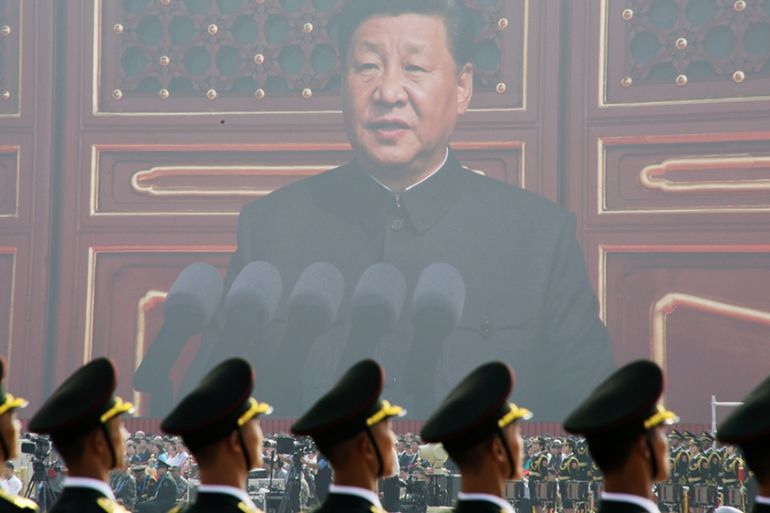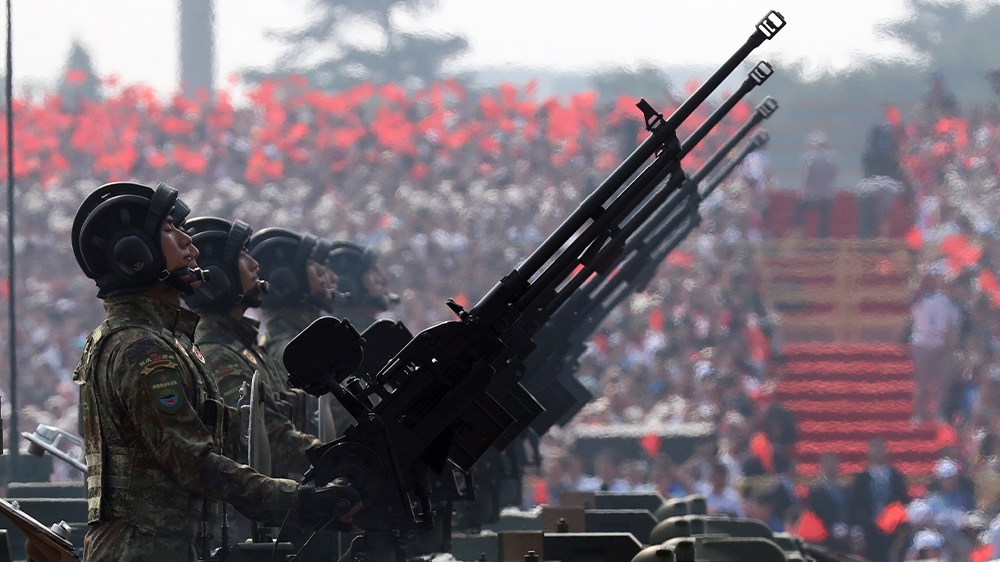Communist China celebrates 70th birthday as Hong Kong simmers
President and party leader Xi Jinping says ‘no force’ can shake China as country displays its military strength.

China’s President Xi Jinping has opened celebrations to mark 70 years of Communist rule, vowing that “no force” would be able to shake the country, as a parade of massed troops and military hardware showcased Chinese muscle in the face of an unprecedented challenge to its authority in Hong Kong.
“There is no force that can shake the foundation of this great nation,” Xi told invited delegates on Tuesday as he stood at the Tiananmen Square gate where Mao Zedong declared the People’s Republic of China in October 1949.
Keep reading
list of 4 itemsBiden and Xi hold first discussions since November, talk Taiwan and tech
‘Obstetric winter’: Why are China’s hospitals shutting delivery wards?
What is Article 23, Hong Kong’s new draconian national security law?
“No force will be able to stop the steady march forward of the Chinese people and Chinese nation.”
Authorities in Beijing tightened security in the city ahead of the invitation-only event, cleaning up neighbourhoods, banning dogs of a certain size from the streets and ordering birds caged. Ordinary people had to stay at home if they wanted to see the event, which was broadcast live on national television.
After his speech, Xi, the country’s most powerful leader since Mao, reviewed the troops from the rear of an open-topped Red Flag or Hongqi limousine, nodding occasionally to the personnel before him.
|
|
New weapons – including a hypersonic ballistic nuclear missile capable of breaching anti-missile defences to reach the United States – were rolled out across the tarmac, and soldiers marched in unison across the vast square.
The display of military might comes as Xi faces a series of challenges that threaten the economy and risk stability at home.
“The CCP is anxious,” Xun Zhou, an expert in Chinese politics at Britain’s University of Essex, wrote in a paper in The Conversation.
“Alongside continued unrest in Hong Kong and tensions with Taiwan, China’s economy is flagging, the wealth gap growing, and health scandals increasing. Fewer and fewer people in China trust the current leadership.”
There is also pressure internationally, amid a trade war with the US, the detention of two Canadians in the wake of the arrest of a senior Huawei executive in Canada, and horror at the mass detention of ethnic Uighurs in the far western province of Xinjiang, to which China has responded by saying the Uighurs are being held in “vocational training centres”.

Not in a celebratory mood
In Hong Kong, protesters were in no mood to celebrate.
Al Jazeera’s Scott Heidler said protesters were eager to use the occasion to drive their message home.
“It’s a very, very important day generally for the People’s Republic of China but especially for Xi Jinping,” he said. “He has really pushed forward in his leadership this ‘one China’ policy and what we’ve seen here in Hong Kong with these protesters is going against that.”
Hong Kong’s streets were quiet on Tuesday morning, with many shops opting to close and police issuing ominous warnings of trouble as the city’s traditional flag-raising ceremony was moved indoors.
|
|
Since June, Hong Kong has been embroiled in the worst unrest since it reverted to Chinese rule in 1997, with riot police and protesters engaged in running battles on the streets.
Demonstrations began on Tuesday afternoon, as thousands of black-clad protesters began to march in defiance of a police decision to reject a permit for a rally.
“Fight for freedom. Stand with Hong Kong,” they chanted. Some of the protesters torched the Chinese national flag.
Hong Kong’s acting leader – Chief Secretary Matthew Cheung – said at the flag-raising ceremony that the city had become “unrecognisable” as a result of the protests.
Embattled Hong Kong leader Carrie Lam was in Beijing, pictured smiling alongside Communist Party grandees and other guests on Monday watching the air display, march and a showcase of China’s newest weapons.
After 17 weeks of protests in Hong Kong, Victor Gao, vice president at the Centre for China and Globalisation in Beijing, said it was up to Lam and her government to “step up and do their job” in addressing the situation in the territory.
‘Unity’
Xi referenced the “one country, two systems” policy under which Hong Kong enjoys freedoms unseen on the mainland in his speech, stressing it was crucial for the “long-term prosperity and stability” of Hong Kong and Macau, formerly a Portuguese colony.
Guy Saint-Jacques, Canada’s Ambassador to China from 2012 to 2016, told Al Jazeera that “unity” remained one of China’s paramount goals.
“The problem with Hong Kong is that China doesn’t know how to handle the protests,” Saint-Jacques said from Montreal. “They don’t have a habit of democracy and they don’t know how it works. (And) they worry that the contestation in Hong Kong could spread to the mainland.”

Xi’s call for unity was also directed at Taiwan, the self-ruled island where the defeated nationalists set up a government in 1949.
|
|
People on the island, which China has vowed to retake by force if necessary, appeared to have little interest in the celebrations on the mainland, even with the events in Hong Kong and Taiwan’s own elections due in January.
“Frankly, there is no ‘reunifying’, since Taiwan is an independent country,” said Joyce Kao, a 31-year-old marketing manager who said she had never watched the celebration and never would.
As expected, Xi referred again in Tuesday’s address to his “Chinese dream”; his plan to rejuvenate China and return the country to what he sees as its rightful place in the world.
“Today has to be understood mainly in terms of China’s domestic politics,” said Geoff Raby, who was Australia’s ambassador to China between 2007 and 2011.
“This is all very much about reaffirming the leading role of the Communist Party, Xi’s role at the top of the Communist Party and the extent to which the Communist Party is responsible for building a strong, prosperous and internationally-respected country.”
The Communist Party has held on to power for 70 years, despite the deaths of tens of millions of people as a result of Mao’s Great Leap Forward, and the violent upheaval of the Cultural Revolution that only came to an end when Mao died in 1976.
A more open economic policy initiated by Deng Xiaoping, who followed Mao as paramount leader, helped kick-start growth and development. He also authorised the use of force to maintain power, most notoriously in Tiananmen Square in 1989.
With additional reporting by Violet Law in Hong Kong and Randy Mulyanto in Taipei.
